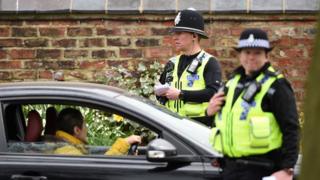 Image copyright
Getty Images
Image copyright
Getty Images
The lockdown rules have changed across all parts of the UK - with the most relaxed regime now operational in England.
The devolved administrations in Scotland, Wales and Northern Ireland set their own rules - and in each part of the UK, the police must enforce them.
Wherever you live in the UK, the police can:
There are now at least 17 laws, known as regulations, governing freedom of movement across the UK - here are the links to the most important:
Originally, it was against the law in every part of the UK to be outside the place where you live "without reasonable excuse", or to be part of a public gathering.
Today, the picture is really complicated. So let's start with England.
From 1 June, anyone in England can be outside without needing a reasonable excuse. If someone wants to take a long car journey, they no longer need to explain themselves - providing they're returning home that day.
Once outside, be it in public or a back garden, they can gather in groups of up to six people and the police won't intervene.
For the first time since the lockdown began, people in England can stay overnight away from home for a range of specific reasons that include:
- Attending a funeral
- For reasonably necessary work
- To provide care, or to avoid injury or harm.
Crucially, there is a still a general ban on any indoor meetings of more than two people, unless they have a similar reason, defined in law, for doing so.
The latest guidance to police in England tells officers they can order people to leave a home if they find an illegal indoor meeting.
These changes have created some rather unusual legal anomalies. Today in England, it's an offence for a couple who do not live together to have an amorous reunion indoors. However, there is no actual legal requirement to remain 2m (6ft) apart in a back garden - although it remains a key part of the government guidance.
What about the rest of the UK?
In Scotland, Wales and Northern Ireland, people still need a reasonable excuse to be outside.
The law across the UK has never been explicitly clear on what this means (see the Dominic Cummings row), but it does give examples which include:
- Shopping for basic necessities
- Exercise
- Travelling to and from necessary work
- Providing care to someone who is vulnerable
- Fleeing harm - such as domestic abuse
The law stresses that if you're on your own property, including a yard, garage or alley which is part of where you live, the police have no power to tell you what to do, unless you're having a gathering that's breaking the lockdown.
In Northern Ireland, groups of up to six people who do not share a household can meet outdoors under a relaxation of the law.
In Scotland and Wales, the law now allows "two households" to meet outside but doesn't specify numbers. However Scottish guidance is to keep it to maximum of eight people.
BBC country-specific lockdown law guides:
What are the penalties?
If someone fails to follow any of the regulations that apply in their part of the UK, police officers could give them an on-the-spot penalty. This is basically an instant fine, like a parking ticket, without the involvement of a court, unless the recipient wants to challenge it.
In England those penalties now start at £100 for a first offence - reduced to £50 if paid promptly. Repeat offences will lead to penalties that will reach a maximum of £3,200. These penalties are lower in the rest of the UK.
Police could ultimately charge anyone, anywhere in the UK, with the offence of breaching coronavirus regulations.
That power would lead to court, possible conviction - and therefore a criminal record - and even greater fines.
Can police stop travel from one part of the UK to the other?
The ban on holidays remains in force in all parts of the UK - but the prime minister says you can travel.
However, he has no say over how the coronavirus regulations should be enforced by police outside England - and any driving into Scotland or Wales needs a good reason to do so.
If a family from Bristol drives about 70 miles, within England, for a day's country walking on Exmoor, they won't be stopped by the police.
If the same family drives a similar distance to the Brecon Beacons in Wales, they run the risk of arrest.
This is not hypothetical. South Wales Police has previously announced that people from England are to appear in court for travelling to paraglide off Nash Point in Glamorgan.
What advice have police received?
Front-line police may need to work very hard to decide whether someone is wilfully breaking the rules, has a genuine defence or has misunderstood them because of the differences across the UK.
Officers across all four parts of the UK have been told by their chiefs to follow "Four Es":
- Engage with people - ask them why they are out
- Explain the law and if necessary set out the reason why they need to be inside, stressing the risks to public health
- Encourage them to go home if they have no reasonable excuse
- Enforce only as a last resort